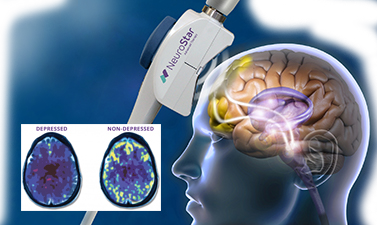Statesboro Psychiatric
Associates
Magnetic energy similar to what is used in an (MRI) is used to stimulate the areas of the brain that are sluggish and causing depressed mood.

Clinical trials have demonstrated the safety and effectiveness of NeuroStar® Advanced Therapy in treating patients who have not benefited from prior antidepressant medication. NeuroStar Advanced Therapy was studied in adult patients suffering from Major Depressive Disorder, all of whom had not received satisfactory improvement with previous treatments.
TMS stands for transcranial magnetic stimulation. It is used to treat depression by stimulating the brain using electromagnetic fields, similar to those produced by an MRI machine. TMS is non-invasive, meaning that it does not involve surgery. It does not require any anesthesia or sedation, as the patient remains awake and alert during the treatment. TMS is also non-systemic, meaning that it is not taken by mouth and does not circulate in the blood stream, limiting its side effects.
TMS uses short pulses of magnetic fields to stimulate the area of the brain that is thought to function abnormally in patients with depression. The magnetic field produces an electric current in the brain that stimulates the brain cells (neurons). This results in changes that are found to be beneficial in the treatment of depression.
While there may be some minor discomfort at the treatment site (where the device touches your head), it generally subsides within the first week or treatment. There is no sedation, or impact on your alertness. You can read, watch TV, or talk with your treatment coordinator during your session, and you can drive home immediately after treatment.
Since the FDA clearance of TMS in 2008, insurance coverage for eligible patients has increased significantly. Most major insurance companies have recognized the effectiveness of treating depression with TMS and now cover TMS as part of their plans. These insurance companies include BCBS, United Healthcare/Optum, Humana, Aetna, Memorial Health Partners, and Beacon.
Yes, in clinical trials, TMS was safely administered with and without antidepressant medications.
© 2024 Statesboro Psychiatric Associates. All Rights Reserved.